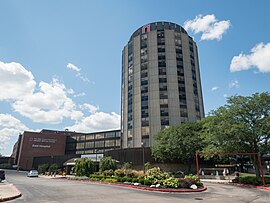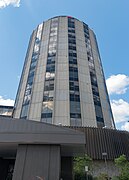
Saint Louis University Hospital is a 356-bed non-profit, research and academic medical center located in St. Louis, Missouri, United States, providing tertiary care for the east Missouri region. The medical center is a part of the SSM Health System and is affiliated with the Saint Louis University School of Medicine. SLUH features an ACS designated adult Level 1 Trauma Center and has a helipad to handle medevac patients.

Downtown Louisville is the largest central business district in the Commonwealth of Kentucky and the urban hub of the Louisville, Kentucky Metropolitan Area. Its boundaries are the Ohio River to the north, Hancock Street to the east, York and Jacob Streets to the south, and 9th Street to the west. As of 2015, the population of downtown Louisville was 4,700, although this does not include directly surrounding areas such as Old Louisville, Butchertown, NuLu, and Phoenix Hill.

The LeVeque Tower is a 47-story skyscraper in Downtown Columbus, Ohio. At 555 feet 5 inches (169.29 m) it was the tallest building in the city from its completion in 1927 to 1974, and remains the second-tallest today.
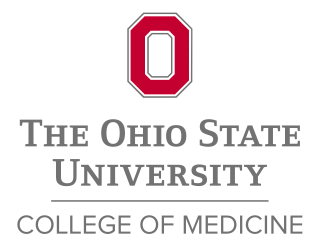
The Ohio State University College of Medicine is the medical school at Ohio State University. It is located in Columbus, Ohio. The college is nationally recognized as a top institution in both education and research, as reflected by rankings in U.S. News & World Report, Tier 1 in Best Medical Schools: Research. In 2023, its two primary teaching hospitals were ranked as one of the best hospitals in the US in 9 and 10 different specialties, respectively; and Nationwide Children's Hospital was named to U.S. News & World Report's select honor roll of US Best Children's hospitals.
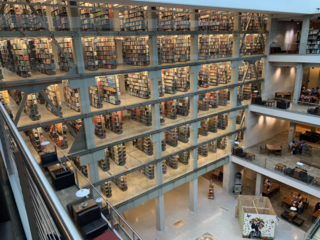
The William Oxley Thompson Memorial Library is the main library at Ohio State University's Columbus campus. It is the university's largest library and houses its main stacks, special collections, rare books and manuscripts, and many departmental subject libraries. The library was originally built in 1912, and was renovated in 1951, 1977, and 2009. It is named in honor of the university's fifth president, William Oxley Thompson.

Olentangy West is a neighborhood approximately 5 miles (8 km) northwest of downtown Columbus, Ohio, United States. Also called West Olentangy, it is generally bordered by West Henderson Road on the north, the Olentangy River and Clintonville on the east, Kinnear Road on the south, and Upper Arlington on the west. The area is primarily residential, although the large Riverside Methodist Hospital and the headquarters for Chemical Abstracts Service are located within its boundaries. Additionally, the west campus of Ohio State University is located within the southern boundary of the area.

Downtown Columbus is the central business district of Columbus, Ohio. Downtown is centered on the intersection of Broad and High Streets, and encompasses all of the area inside the Inner Belt. Downtown is home to most of the tallest buildings in Columbus.

Mount Vernon is a predominantly African-American historic neighborhood in Columbus, Ohio, United States. The neighborhood lies within the historic Near East Side community, north of King-Lincoln Bronzeville. Mount Vernon borders Interstates 71 and 670. Its main thoroughfares, Mount Vernon Avenue, Long Street, Atcheson Street, and Champion Avenue define the community's limits.

OhioHealth Grant Medical Center is a hospital in Downtown Columbus, Ohio. The facility was established in 1900 as the second member hospital of OhioHealth, a not-for-profit, faith-based healthcare system. Grant Medical Center is a Level I Trauma Center.

Firmin Desloge Hospital is a hospital in St. Louis, Missouri, opened in 1932 by the Jesuits of Saint Louis University and the Sisters of Saint Mary. Named for the benefactor, Firmin V. Desloge, it was established to serve the poor and others in need. Located on Grand Avenue between Vista Avenue and Rutger Avenue, Firmin Desloge Hospital was the main hospital building of the St. Louis University Medical Center until a new hospital was built and opened in 2020.

Abraham Lincoln Tower & Justin S. Morrill Tower, also known as The Towers, Morrill Tower or Lincoln Tower are two undergraduate residential houses at Ohio State University. The Towers are located on the Ohio State University across from the east banks of the Olentangy River. The towers are on Cannon Drive in close proximity of the Ohio Stadium, RPAC, and the Wexner Medical Center.

Franklin Park is a neighborhood located on the Near East Side of Columbus, Ohio. Both the historic neighborhood and landmark, the Franklin Park Conservatory and Botanical Gardens, are named after the 88-acre park.

The Toledo and Ohio Central Railroad Station, today named Station 67, is a union meeting space and event hall located in Franklinton, near Downtown Columbus, Ohio. Built by the Toledo and Ohio Central Railroad from 1895 to 1896, it served as a passenger station until 1930. It served as an office and shelter for Volunteers of America from 1931 to 2003, and has been the headquarters of International Association of Fire Fighters Local 67, a firefighters' union, since 2007. The building was placed on the National Register of Historic Places in 1973. During its history, the building has experienced fires and floods, though its relatively few owners have each made repairs and renovations to preserve the building's integrity. The building is the last remaining train station in Columbus.
S.G. Loewendick & Sons, also known as Loewendick Demolition Contractors, is a demolition company based in Grove City, Ohio, a suburb of Columbus. The company is the largest specializing in demolition in Central Ohio. It has torn down most of the landmark buildings in Columbus in recent decades, including Union Station, the Ohio Penitentiary, the Christopher Inn, the Deshler Hotel, and the Ohio State University Drake Performance and Event Center.
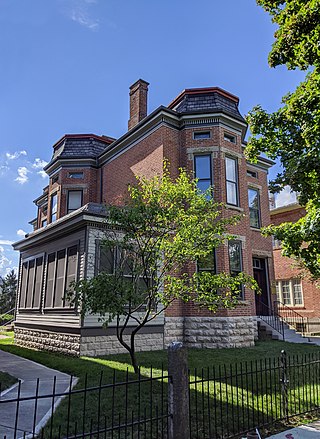
The Columbus Landmarks Foundation, known as Columbus Landmarks, is a nonprofit historic preservation organization in Columbus, Ohio. The foundation is best-known for its list of endangered sites in the city and its annual design award, given to buildings, landscapes, and other sites created or renovated in Columbus. It was established in 1977 as a project of the Junior League of Columbus, Ohio, following the demolition of the city's historic Union Station. It is headquartered at 57 Jefferson Avenue, a contributing structure in the Jefferson Avenue Historic District in Downtown Columbus.

The former Columbus Railway, Power & Light office is a historic building in the Milo-Grogan neighborhood of Columbus, Ohio. The two-story brick structure was designed by Yost & Packard and built in the 1890s as a transportation company office. The property was part of a complex of buildings, including a power plant, streetcar barn, and inspection shop. The office building, the only remaining portion of the property, was utilized as a transit office into the 1980s, and has remained vacant since then. Amid deterioration and lack of redevelopment, the site has been on Columbus Landmarks' list of endangered sites since 2014.

University Hall is the main academic building at the Ohio State University in Columbus, Ohio. The building houses classrooms for several of the university's colleges and includes a museum on the ground floor.
The Henderson House is a historic building in the Mount Vernon neighborhood of Columbus, Ohio. The house was built in the late 19th or early 20th century, and was notably owned by Leonard Pearl Henderson, who made the property a hub for traveling Black entertainers.
